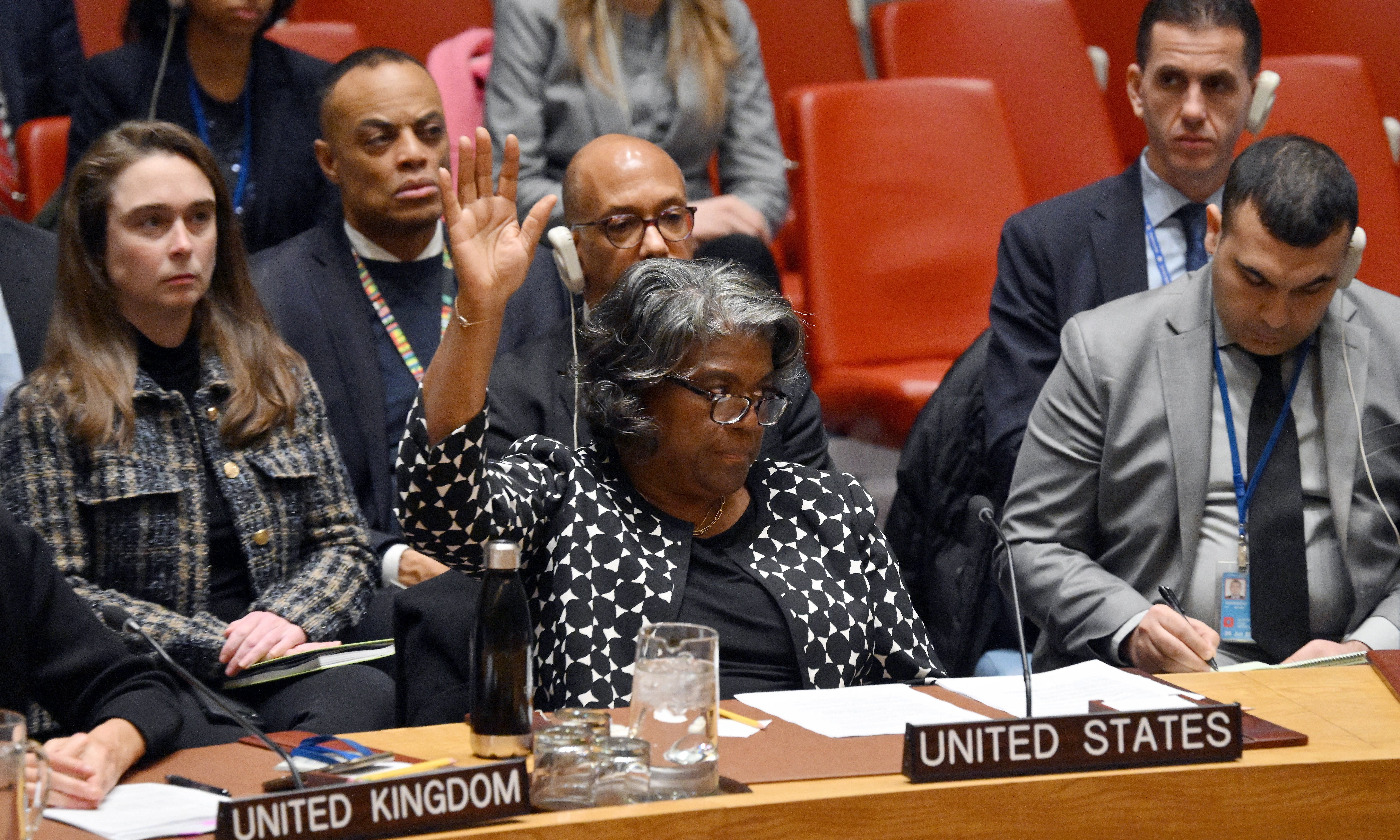US vetoes UN resolution calling for ‘immediate humanitarian ceasefire’ in Gaza
US was the only country on the 15-member Security Concil to vote against the resolution
Your support helps us to tell the story
From reproductive rights to climate change to Big Tech, The Independent is on the ground when the story is developing. Whether it's investigating the financials of Elon Musk's pro-Trump PAC or producing our latest documentary, 'The A Word', which shines a light on the American women fighting for reproductive rights, we know how important it is to parse out the facts from the messaging.
At such a critical moment in US history, we need reporters on the ground. Your donation allows us to keep sending journalists to speak to both sides of the story.
The Independent is trusted by Americans across the entire political spectrum. And unlike many other quality news outlets, we choose not to lock Americans out of our reporting and analysis with paywalls. We believe quality journalism should be available to everyone, paid for by those who can afford it.
Your support makes all the difference.The United States vetoed a United Nations Security Council resolution on Tuesday that called for an “immediate humanitarian ceasefire” in Gaza, a decision that puts it at odds with most of the world, including a significant number of its allies.
The US was the only country on the 15-member council to vote against the resolution, while the United Kingdom abstained. It was the third time the US has vetoed a UN resolution aimed at bringing about a ceasefire in Gaza since the conflict began.
The vote was yet another sign of President Joe Biden’s increasing isolation on the world stage as his administration continues to resist global pressure over its unconditional support for Israel’s war, which was sparked by a Hamas attack on 7 October that killed 1,200 people.
The resolution was tabled by Algeria and has been backed in some form by more than three-quarters of the 193-member UN General Assembly.
It comes as Israel prepares an offensive on the southern Gazan city of Rafah, where more than 1 million displaced Palestinians are now sheltering after fleeing from across the mostly destroyed territory. Aid agencies have warned of a “bloodbath” if the offensive goes ahead.
Linda Thomas-Greenfield, the US ambassador to the UN, said the resolution would “negatively impact” negotiations between Israel and Hamas on the release of hostages held in Gaza.
“Demanding an immediate, unconditional ceasefire without an agreement requiring Hamas to release the hostages will not bring about a durable peace. Instead, it could extend the fighting between Hamas and Israel,” Ms Thomas-Greenfield said.
The US has instead proposed a draft resolution calling for a “temporary ceasefire” in Gaza “as soon as practicable”.
The draft resolution also warns against Israel’s ground incursion in Rafah in southern Gaza, where over 1 million Palestinians have sought refuge after they were violently displaced by Israel’s months-long campaign.

Israel’s retaliatory assault in the wake of Hamas’s attacks has killed more than 29,000 people in Gaza since 7 October, including 13,000 children.
Using unusually critical language for the US of its close ally Israel, the resolution notes that an offensive in Rafah would “result in further harm to civilians and their further displacement including potentially into neighbouring countries” and “would have serious implications for regional peace and security, and therefore underscores that such a major ground offensive should not proceed under current circumstances”.
Last week, Mr Biden warned Benjamin Netanyahu that such an operation “should not proceed,” according to a readout of their call from the White House.
The UN’s humanitarian aid chief Martin Griffiths has warned that Israel’s “military operations in Rafah could lead to a slaughter in Gaza” and would leave “an already fragile humanitarian operation at death’s door”.
In a speech putting forward the resolution, Algeria’s UN ambassador, Amar Bendjama, said that voting against it “implies an endorsement of the brutal violence and collective punishment inflicted upon them”.
“Today, every Palestinian is a target for death, extermination and genocide. We should ask ourselves how many innocent lives must be sacrificed before the council deems it necessary to call for a ceasefire,” he added.
Following votes, Security Council president Carolyn Rodrigues-Birkett of Guyana said the council is “once again disappointed” by its repeated failure to demand a ceasefire.
“A ceasefire is the difference between life and death for the tens of thousands of Palestinians and others stuck in the warzone that Gaza has become,” she said.
Within the three weeks since Algeria’s draft resolution was first circulated, thousands of people have been killed and injured in Gaza, while “every aspect of life has gotten worse” for Palestinians who face “devastating levels” of food insecurity, hunger and famine, she said.
“How many more lives must be lost? How many lives must be maimed?” she said.
Palestine’s UN ambassador Riyad Mansour warned that, at that rate, “By the time this security council session ends, more than 25 Palestinians will have been killed.”
The US has vetoed 89 Security Council resolutions in total since 1945, and more than half of them have been resolutions critical of Israel.
Rafah, on the southern border with Egypt, is the last remaining refuge for Gaza’s civilian population and one of the only areas yet to be the target of an Israeli ground offensive. It is normally home to around 280,000 people, but currently houses over half of Gaza’s population of 2.3 million.
Most are crammed into tents, makeshift shelters, schools or hospital grounds, having been uprooted multiple times by repeated Israeli evacuation orders as Israel’s military campaign has progressed across the strip over the past four months of war.

Join our commenting forum
Join thought-provoking conversations, follow other Independent readers and see their replies
Comments